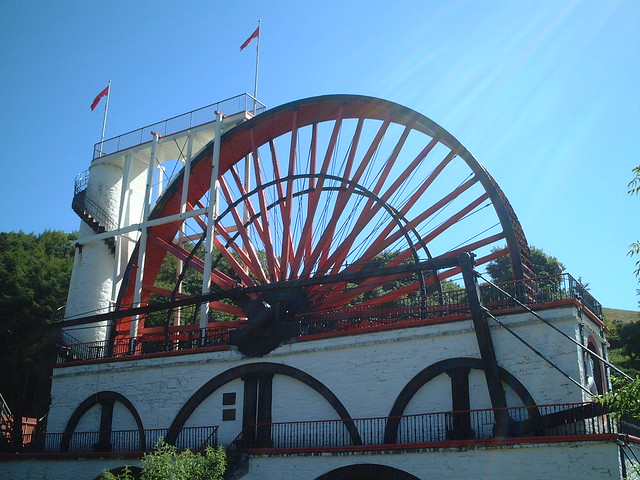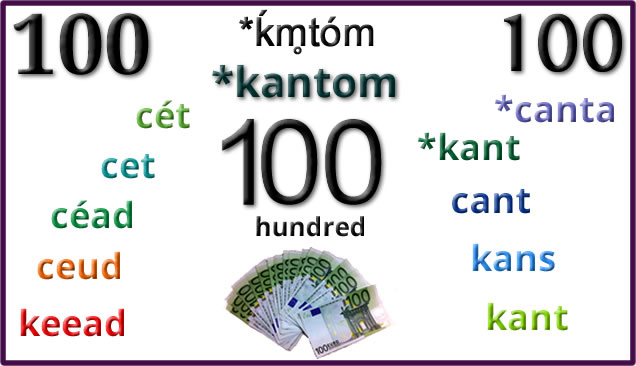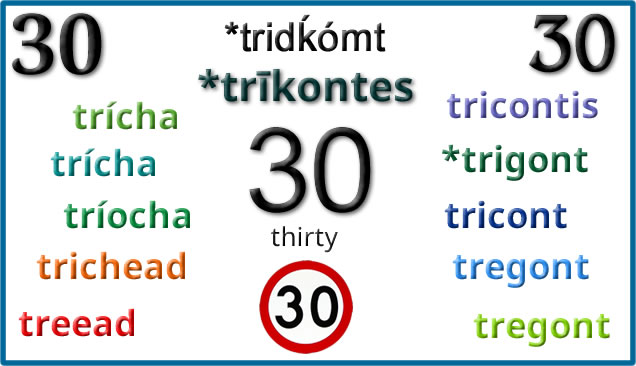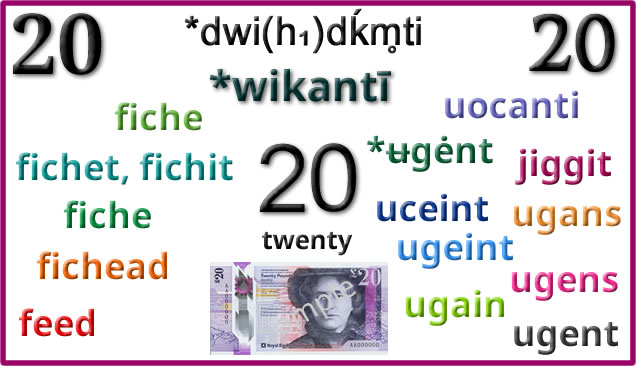Words for wheel and related words in Celtic languages.
Words marked with a * are reconstructions.
| Proto-Celtic | *rotos = wheel, chariot |
|---|---|
| Gaulish | *Rotomagos = placename [see below] |
| Old Irish (Goídelc) | roth = disc, sphere, wheel rothmol = gyration |
| Middle Irish (Gaoidhealg) | roth, routh = wheel, something circular or wheel-shaped, disc, sphere, circular brooch, wheel brooch, loop, noose roithled = the act of rotating or twirling roithlén = wheel roithreim = the rolling, rushing of wheels rothán = small wheel rothmol = wheel of a water mill, gyration, scrimmage |
| Irish (Gaeilge) | roth [ɾˠɔ(h)/ɾˠɞh] = wheel, bicycle rothach = wheeled, cyclic(al) rothadóir = wheelwright rothaí = cyclist rothaigh = to cycle rothaíocht = cycling rothán = small wheel, loop, ring, hank rothar = bicycle |
| Scottish Gaelic (Gàidhlig) | roth [r̪ˠɔh] = wheel, halo, crown (in a mill) roth-fiaclach = cog roth-gaoithe = ventilator roth-uisge = water wheel roth-mór = millwheel, ferris wheel rothag = small wheel, small circle rothaiche = wheel, cyclist rothair = bicycle, bike, cycle, roller, cylinder rothaireachd = cycling rothair-motair = motorbike, motorcycle rothalan [r̪ˠɔhəl̪ˠan] = person or animal running in circles |
| Manx (Gaelg) | roar = bicycle, bike roaragh = cyclist roaraght = cycling roar-bree = motorcycle roar-slieau = mountain bike |
| Proto-Brythonic | *rrod = wheel |
| Middle Welsh (Kymraec) | rot, rod, rhôd = wheel |
| Welsh (Cymraeg) | rhod [r̥oːd] = wheel, spinning wheel, waterwheel, cogwheel, (round) shield), sphere, circle, orbit, firmament, heaven, (wheel of) fortune, fate, course, circuit, round, district, world rhod ddŵr waterwheel rhod wynt = windmill rhodellaf, rhoedellu = to whirl, twirl rhodig = small wheel, rowel (of spur) deurod = bicycle (“two wheel”) |
| Middle Cornish (Cernewec) | ros, rôs = circle, wheel |
| Cornish (Kernewek) | ros [ˈɹoːz] = wheel ros lovan = winch ros melin = mill wheel ros parys = spare wheel ros velin = millwheel ros-lewya = steering wheel rosella = to rotate, spin rosellans = rotation rosik = castor roskesya = roller skating roskis = rollerskates diwros = bicycle (“two wheel”) |
| Middle Breton (Brezonec) | rod, rot = wheel, spinning wheel rot melin, rod milin = millwheel |
| Breton (Brezhoneg) | rod [ˈroːt] = wheel rod-avel = wind turbine rod-vilin = millwheel rodal = to do a cartwheel rodeg = cycle rodell = loop rodellig = small curl, bouclette |
Etymology: from PIE *Hret- (to run) [source].
The city of Rouen, the capital of Normandy in northern France, gets its name from the Latin Rōtomagus, which was the chief city of the Veliocasses in Gallia Lugdunensis (where Rouen is now), and was borrowed from Gaulish, from the Proto-Celtic *rotos (wheel) and *magos (field) [source].
Other words from the same roots include words for to run in Celtic languages, the Welsh name Rhys, and rota, rotor and rotate in English [source].
| Proto-Celtic | *drokos = wheel |
|---|---|
| Old Irish (Goídelc) | droch [drox] = wheel, circlet drochet [ˈdrox(ʲ)ed] = bridge – from droch (wheel) and sét (path, way) |
| Middle Irish (Gaoidhealg) | droch = wheel, circlet drochet, drochat, droget = bridge, causeway |
| Irish (Gaeilge) | droichead = bridge |
| Scottish Gaelic (Gàidhlig) | droch [drɔx] = coach wheel (obselete) drochaid = bridge |
| Manx (Gaelg) | droghad = bridge, arch, gantry |
Etymology: from PIE *dʰregʰ- (to run, drag, pull) [source].
Words from the same PIE root include drag, draw (to pull, drag) and retract in English, and դուրգ (durg – potter’s wheel) in Armenian [source].
| Proto-Celtic | *olēnā = wheel |
|---|---|
| Old Welsh | olun, olin = wheel, circular, to rotate |
| Middle Welsh (Kymraec) | olwyn, olvyn, ōlwyn = wheel olwynnyawc, olŵynog, olwŷnog = wheeled, turning, revolving |
| Welsh (Cymraeg) | olwyn [ˈɔlʊɨ̯n/ˈoːlʊi̯n] = wheel, shaft olwyn gocos cog wheel olwyn ddŵr = waterwheel olwyn lywio = streering wheel olwyndro = cartwheel olwyndroi = to cartwheel, spin olwynfarch = bicycle olwyn(i)af, olwyn(i)o = to wheel, turn, revolve, roll olwyn(i)og = wheeled, turning, revolving olwynol = wheel-shaped, circular, revolving olwynur = bicycle olwynwr = wheelwright, cyclist |
Etymology: from Proto-Celtic *Heh₃l- (to bow, bend, elbow) [source].
Words from elbow in Celtic languages come from the same PIE root via the Proto-Celtic *olīnā (elbow, angle) [more details], as do the English words elbow and ulna (one of the bones in the forearm, a.k.a. elbow bone) [source].
| Irish (Gaeilge) | cuidhil [kiːlʲ/kiəlʲ] = spinning wheel (in Antrim) |
|---|---|
| Scottish Gaelic (Gàidhlig) | cuidheall [kujəl̪ˠ] = wheel, coil cuidheall-shnìomha = spinning wheel cuibheall-iteachain = bobbin wheel saor-chuidhleachan = wheelwright |
| Manx (Gaelg) | queeyl(l) = wheel queeyl chairt = cartwheel queeylit = wheeled queeyllagh = cartwheel, rotary, wheeled, wheeling queelylley = rolling, wheeling whirling daawheeyl = bicycle |
Etymology: from Scots quhe(i)l (wheel), from Middle English whel (wheel), etc [source].
| Scottish Gaelic (Gàidhlig) | cuibhle [kuilə] = wheel, coil cathair-cuibhle = wheelchair cuibhle-shnìomha = ship’s wheel, steering wheel cuibhlearachd = wheeling, rolling, coiling cuibhle = millwheel, ferris wheel cuibhleas = wheelhouse cuibhleag = small coil, small eddy |
|---|---|
| Welsh (Cymraeg) | whil, wil = wheel w(h)ilaf, w(h)ilo = to wheel, roll w(h)ilber = wheelbarrow w(h)ilberaid = wheelbarrowful w(h)ilber(i)o = to carry in a wheelbarrow whilbws = wheelhouse |
| Middle Cornish (Cernewec) | wheyl, wheal, whél = work, wheel |
Etymology: from English wheel, from Middle English whel (wheel), from Old English hwēol (wheel), from Proto-Germanic *hweulō (wheels), from PIE *kʷékʷlom (wheel) from *kʷel- (to turn) [source].
According to MacBain’s An Etymological Dictionary of the Gaelic Language, the Gaelic cuibhle was borrowed from English [source].
Sources: Wiktionary, Am Faclair Beag, Online Manx Dictionary, Teanglann.ie, eDIL – Electronic Dictionary of the Irish Language, In Dúil Bélrai English – Old Irish glossary, Geiriadur Prifysgol Cymru, Gerlyver Kernewek, Dictionaire Favereau, TermOfis, English – ProtoCeltic WordList (PDF), Etymological Dictionary Of Proto Celtic










